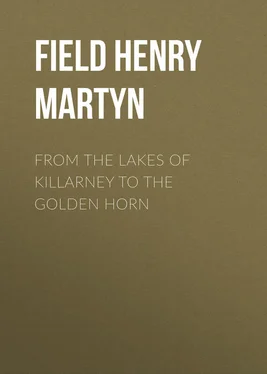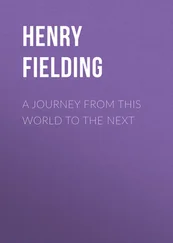Henry Field - From the Lakes of Killarney to the Golden Horn
Здесь есть возможность читать онлайн «Henry Field - From the Lakes of Killarney to the Golden Horn» — ознакомительный отрывок электронной книги совершенно бесплатно, а после прочтения отрывка купить полную версию. В некоторых случаях можно слушать аудио, скачать через торрент в формате fb2 и присутствует краткое содержание. Жанр: foreign_antique, foreign_prose, Путешествия и география, на английском языке. Описание произведения, (предисловие) а так же отзывы посетителей доступны на портале библиотеки ЛибКат.
- Название:From the Lakes of Killarney to the Golden Horn
- Автор:
- Жанр:
- Год:неизвестен
- ISBN:нет данных
- Рейтинг книги:5 / 5. Голосов: 1
-
Избранное:Добавить в избранное
- Отзывы:
-
Ваша оценка:
- 100
- 1
- 2
- 3
- 4
- 5
From the Lakes of Killarney to the Golden Horn: краткое содержание, описание и аннотация
Предлагаем к чтению аннотацию, описание, краткое содержание или предисловие (зависит от того, что написал сам автор книги «From the Lakes of Killarney to the Golden Horn»). Если вы не нашли необходимую информацию о книге — напишите в комментариях, мы постараемся отыскать её.
From the Lakes of Killarney to the Golden Horn — читать онлайн ознакомительный отрывок
Ниже представлен текст книги, разбитый по страницам. Система сохранения места последней прочитанной страницы, позволяет с удобством читать онлайн бесплатно книгу «From the Lakes of Killarney to the Golden Horn», без необходимости каждый раз заново искать на чём Вы остановились. Поставьте закладку, и сможете в любой момент перейти на страницу, на которой закончили чтение.
Интервал:
Закладка:
It was indeed a wonderful spectacle. The building is somewhat like Barnum's Hippodrome, though not so large, and of better shape for speaking and hearing, being not so oblong, but more square, with deep galleries, and will hold, I should say, at a rough estimate, six or eight thousand people. The front of the galleries was covered with texts in large letters, such as "God is Love"; "Jesus only"; "Looking unto Jesus, the author and finisher of our faith"; "Come unto Me, all ye that labor and are heavy laden, and I will give you rest." At each corner was a room marked "For inquirers."
As we had entered by mistake the wrong door, instead of finding ourselves on the platform beside Mr. Moody, we had been borne by the crowd to the gallery at the other end of the building; but this had one advantage, that of enabling us to test the power of the voices of the speakers to reach such large audiences. While the immense assemblage were getting settled in their places, several hymns were sung, which quietly and gently prepared them for the services that were to follow.
At length Mr. Moody appeared. The moment he rose, there was a movement of applause, which he instantly checked with a wave of his hand, and at once proceeded to business, turning the minds of the audience to something besides himself, by asking them to rise and sing the stirring hymn,
"Ring the bells of heaven! there is joy to-day!"
The whole assembly rose, and caught up the words with such energy that the rafters rang with the mighty volume of sound. A venerable minister, with white locks, then rose, and clinging to the railing for support, and raising his voice, offered a brief but fervent prayer.
Mr. Moody's part in this opening service, it had been announced beforehand, would be merely to preside , while others spoke; and he did little more than to introduce them. He read, however, a few verses from the parable of the talents, and urged on every one the duty to use whatever gift he had, be it great or small, and not bury his talent in a napkin. His voice was clear and strong, and where I sat I heard distinctly. What he said was good, though in no wise remarkable. Mr. Sankey touched us much more as he followed with an appropriate hymn:
"Nothing but leaves!"
As soon as I caught his first notes, I felt that there was one cause of the success of these meetings. His voice is very powerful, and every word was given with such distinctness that it reached every ear in the building. All listened with breathless interest as he sang:
"Nothing but leaves! the Spirit grieves
Over a wasted life;
O'er sins indulged while conscience slept,
O'er vows and promises unkept,
And reaps from years of strife —
Nothing but leaves! nothing but leaves!"
Rev. Mr. Aitken, of Liverpool, then made an address of perhaps half an hour, following up the thought of Mr. Moody on the duty of all to join in the effort they were about to undertake. His address, without being eloquent, was earnest and practical, to which Mr. Sankey gave a thrilling application in another of his hymns, in which the closing line of every verse was,
"Here am I; send me, send me!"
Mr. Spurgeon was reserved for the closing address, and spoke, as he always does, very forcibly. I noticed, as I had before, one great element of his power, viz., his illustrations, which are most apt. For example, he was urging ministers and Christians of all denominations to join in this movement, and wished to show the folly of a contentious spirit among them. To expose its absurdity, he said:
"A few years ago I was in Rome, and there I saw in the Vatican a statue of two wrestlers, in the attitude of men trying to throw each other. I went back two years after, and they were in the same struggle, and I suppose are at it still!" Everybody saw the application. Such a constrained posture might do in a marble statue, but could anything be more ridiculous than for living men thus to stand always facing each other in an attitude of hostility and defiance? "And there too," he proceeded, "was another statue of a boy pulling a thorn out of his foot. I went to Rome again, and there he was still, with the same bended form, and the same look of pain, struggling to be free. I suppose he is there still, and will be to all eternity!" What an apt image of the self-inflicted torture of some who, writhing under real or imagined injury, hug their grievance and their pain, instead of at once tearing it away, and standing erect as men in the full liberty wherewith Christ makes his people free.
Again, he was illustrating the folly of some ministers in giving so much time and thought to refuting infidel objections, by which they often made their people's minds familiar with what they would never have heard of, and filled them with doubt and perplexity. He said the process reminded him of what was done at a grotto near Naples, which is filled with carbonic acid gas so strong that life cannot exist in it, to illustrate which the vile people of the cave seize a wretched dog, and throw him in, and in a few minutes the poor animal is nearly dead. Then they deluge him with cold water to bring him round. Just about as wise are those ministers who, having to preach the Gospel of Christ, think they must first drop their hearers into a pit filled with the asphyxiating gas of a false philosophy, to show how they can apply their hydropathy in recovering them afterwards. Better let them keep above ground, and breathe all the time the pure, blessed air of heaven.
Illustrations like these told upon the audience, because they were so apt, and so informed with common sense. Mr. Spurgeon has an utter contempt for scientific charlatans and literary dilettanti, and all that class of men who have no higher business in life than to carp and criticise. He would judge everything by its practical results. If sneering infidels ask, What good religion does? he points to those it has saved, to the men it has reformed, whom it has lifted up from degradation and death; and exclaims with his tremendous voice, "There they are! standing on the shore, saved from shipwreck and ruin!" That result is the sufficient answer to all cavil and objection.
"And now," continued Mr. Spurgeon, applying what he had said, "here are these two brethren who have come to us from over the sea, whom God has blessed wherever they have labored in Scotland, in Ireland, and in England. It may be said they are no wiser or better than our own preachers or laymen. Perhaps not. But somehow, whether by some novelty of method, or some special tact, they have caught the popular ear, and that of itself is a great point gained – they have got a hold on the public mind." Again he resorted to illustration to make his point.
"Some years ago," he said, "I was crossing the Maritime Alps. We were going up a pretty heavy grade, and the engine, though a powerful one, labored hard to drag us up the steep ascent, till at length it came to a dead stop. I got out to see what was the matter, for I didn't like the look of things, and there we were stuck fast in a snow-drift! The engine was working as hard as ever, and the wheels continued to revolve; but the rails were icy, and the wheels could not take hold – they could not get any grip – and so the train was unable to move. So it is with some men, and some ministers. They are splendid engines, and they have steam enough. The wheels revolve all right, only they don't get any grip on the rails, and so the train doesn't move. Now our American friends have somehow got this grip on the public mind; when they speak or sing, the people hear. Without debating why this is, or how it is, let us thank God for it, and try to help them in the use of the power which God has given them."
Читать дальшеИнтервал:
Закладка:
Похожие книги на «From the Lakes of Killarney to the Golden Horn»
Представляем Вашему вниманию похожие книги на «From the Lakes of Killarney to the Golden Horn» списком для выбора. Мы отобрали схожую по названию и смыслу литературу в надежде предоставить читателям больше вариантов отыскать новые, интересные, ещё непрочитанные произведения.
Обсуждение, отзывы о книге «From the Lakes of Killarney to the Golden Horn» и просто собственные мнения читателей. Оставьте ваши комментарии, напишите, что Вы думаете о произведении, его смысле или главных героях. Укажите что конкретно понравилось, а что нет, и почему Вы так считаете.












